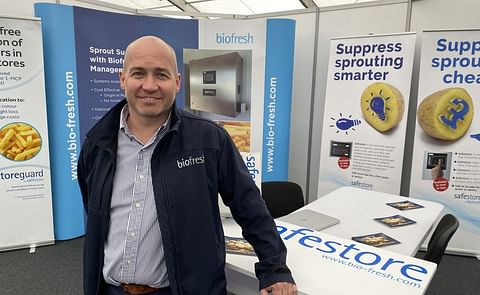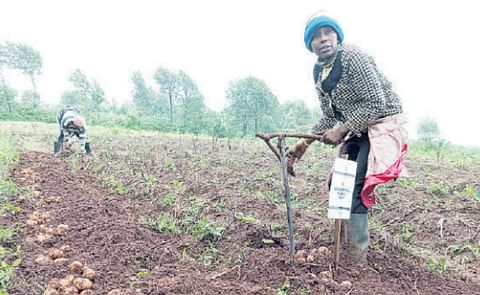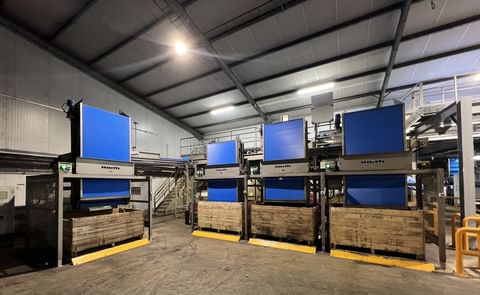Ethiopian farmers help researchers select potato varieties that the market demands (Courtesy: CIP)
Ethiopian farmers help researchers select potato varieties that the market demands

Potato is important to food security and a cash crop in Ethiopia with high potential to improve the livelihoods of small-scale farmers, who account for 83% of the total population and hold 95% of agricultural land. It is widely grown in the highland areas and is one of the few fast growing commodities expanding into non-traditional areas.
The International Potato Center (CIP) has partnered with the Ethiopian Institute of Agricultural Research (EIAR) potato breeding program since 1975 with the objective of improving the productivity and profitability of potato through research and innovation in science, technology and capacity strengthening.
The collaboration has, so far, resulted in the release of about 29 CIP-bred varieties with late blight resistance, high yield, and good quality traits. Among those released varieties, ‘Gudene’ is the most widely grown because of its culinary characteristics and late blight resistance.
According to Gebremedhin Woldegiorgis, a potato breeder at EIAR’s Holetta Agricultural Research Centre (HARC), collaboration with CIP has enabled Ethiopia’s national potato program to obtain germplasm, technical support and training on germplasm evaluation and cleaning, as well as funding, all of which has positively impacted the livelihoods of the country’s potato farmers.
Over the last five years, researchers from CIP and HARC have selected the 15 best variety candidates based on yield, late blight resistance and organoleptic quality (characteristics such as flavor, appearance, smell, and consistency). Those clones were initially grown from true potato seeds imported from CIP headquarters in Peru.
In 2018, gender disaggregated participatory varietal selection (PVS) by farmers was undertaken to determine which of those clones was best suited to local preferences and needs. The 15 clones were planted at HARC along with three local checks (the varieties Dagim, Gudene, and Jalene).
Famers were invited to evaluate those potatoes in the flowering stage, at harvest and 10 days after harvest for organoleptic characteristics.
According to CIP Researcher Hirut Getinet, the farmers’ criteria for selection differed according to gender. At flowering, female farmers selected materials with disease resistance, more stems per plant, thick and strong stems, broader leaves, and those with more abundant foliage, in order of importance.
Male farmers preferred medium maturing materials, more stems per plant, disease resistance, and thick and strong stems. At harvest, the top three preferred selection criteria were the same for both men and women: high tuber yield, medium tuber size and tuber color (preferred by market).
Female representative Aselefech Telila, chairperson of the Gudina women’s improved seed potato producers association, together with her vice chair, Tewabu Diriba, and secretary, Belaynesh Tafa, were enthused about both the clones’ high yield potential and their resistance to late blight disease.
Aselefech Telila, chairperson of the Gudina women’s:
“My group considered number of tubers per plant and the appearance of the tubers— fewer buds and tuber color.”The men who participated in the varietal selection appreciated the opportunity to evaluate the new potato clones during the flowering stage as well as harvest.
Bedada Chala:
“I am hopeful that these new varieties will reach the wider community. The tubers should be medium sized and without any cracks. Just like the women, we count the number of tubers per plant and the skin color of the tubers. Using these criteria, we rank them 1 to 3, one being very good.”Vivian Polar, Gender and Monitoring and Evaluation Specialist for CGIAR Research Program on Roots, Tubers and Bananas (RTB):
“Women’s preferences for disease resistant and vigorous plants, expressed in the PVS evaluations, were related to the constraints they face in access to inputs and equipment to control a disease outbreak.”
“Thus, the new high yielding, disease resistant varieties will contribute to enhanced productivity of both men and women, reducing the gap of unequal access to inputs that women face.”

The EIAR potato breeding program plans to propose one or both of them for release as new varieties, following multi-location field evaluation for stability.
At the end of the PVS evaluations, the farmer representatives reiterated the importance of the potato for food and income. They noted that potato’s yield per unit area is much higher than crops such as barley and wheat, also commonly grown in Ethiopia. Both groups expressed optimism that new varieties would be released from the trials, as the varieties commonly planted in the country are no longer high yielding.
Thiago Mendes, CIP Breeder:
“Gender differentiated participatory varietal selection can be considered as a supportive breeding decision tool for the selection of materials that meet end-user preferences, potentially increasing the adoption of new varieties.”Thiago Mendes added that the variety candidates selected through PVS have the potential to improve farmers’ yields by 40% over the current most widely grown variety, Gudene, because they have greater resistance to late blight, which threatens the production of all the country’s potato farmers.








